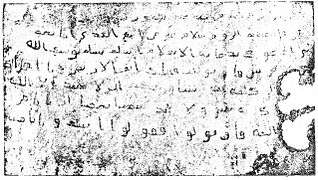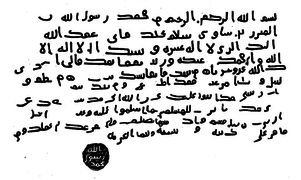Expedition of Zaid ibn Haritha (Hisma)
| Expedition of Zaid ibn Haritha (Hisma) | |||||||
|---|---|---|---|---|---|---|---|
| |||||||
| Commanders and leaders | |||||||
| Zayd ibn Haritha | Al-Hunayd ibn Arid | ||||||
| Strength | |||||||
| 500[1] | Unknown | ||||||
| Casualties and losses | |||||||
| Unknown | Many killed, including chief 100 captured[1][1] | ||||||
Expedition of Zaid ibn Haritha in Hisma took place in October, 628AD, 6th month of 7AH of the Islamic calendar.[2][3] The attack was a response to Dihyah bin Khalifa Kalbi's call for help, after being attacked by robbers. Muslims retaliated and killed many of the robbers and captured 100 tribe members[1]
Background
Envoys sent to invite people to Islam


After the signing the Hudaibiya treaty with the Quraysh in Mecca, Muhammad sent several envoys in a few neighboring countries, inviting them to Islam.[1] The following were sent:
- Amr bin Umayyah al-Damri to the king of Ethiopia (then Abyssinia) called Aṣḥama ibn Abjar.[4]
- Dihyah bin Khalifa Kalbi to the Byzantine king Heraclius[5]
- Hatib bin Abi Baltaeh to the king of Egypt called Muqawqis[5][6]
- Allabn Al-Hazermi to Munzer bin Sawa the king of Bahrain called Munzir ibn Sawa Al Tamimi[5][7]
- Amr ibn al-As to the king of Oman called Abd Al-Jalandi[5][8]
- Salit bin Amri to the king of Yamama called Hawza bin Ali[5][8]
- Shiya bin Wahab to Haris bin Ghasanni to the king of Damascus called Harith bin Abi Shamir Al-Ghassani[5][8]
- Abdullah ibn Hudhafah as-Sahmi to the emperor or Iran (then Persia) called Khosrau II.[9]
One envoy attacked by bandits
He sent Dhiyah bin Khalifah al-Kalbi to the king of Basra, who would in turn send it to Caesar (Heraclius).
In his epistle to Heraclius, the Byzantine emperor, Muhammad wrote:
"In the Name of Allâh, the Most Beneficent, the Most Merciful.From Muhammad, the slave of Allâh and His Messenger to Hercules, king of the Byzantines.
Blessed are those who follow true guidance. I invite you to embrace Islam so that you may live in security. If you come within the fold of Islam, Allâh will give you double reward, but in case you turn your back upon it, then the burden of the sins of all your people shall fall on your shoulders.
To proceed: submit yourself, and you shall be safe. Submit yourself, and God shall give you your reward twice over. But, if you turn away, the sin of the Husbandmen shall be upon you.”
When, after finishing his trip, Dhiya was returning to Medina ; a group of bandit belonging to Banu Judham looted him of everything he had, when he reached Hisma, a place on the way to Syria and west of Tabuk. [1][10]
Muslim response
Dihya approached the Banu Dubayb (a tribe which converted to Islam and had good relations with Muslims) for help. When the news reached Muhammad, he immediately dispatched Zayd ibn Haritha with 500 men to punish them. The Muslim army fought with Banu Judham, killed several of them (inflicting heavy casualties), including their chief, Al-Hunayd ibn Arid and his son, and captured 1000 camels, 5000 of their cattle and a 100 women and boys. The new chief of the Banu Judham who had embraced Islam appealed to Muhammad to release his fellow tribesmen, and Muhammad released them.[1][10]
Islamic primary sources
The event is mentioned by the Muslim jurist Tabari, as follows:
| “ | When Rifa`ahb. Zayd came [to his people] with the Messenger of God's letter inviting them to Islam, they responded. Soon [the following inci-dent happened]. When Dihyah b. Khalifah al-Kalbi, who was re-turning from Caesar, the Byzantine king, [to whom he] was sent by the Messenger of God with some of his merchandise,reached a valley called Shanar, al-Hunayd b. `Us and his son`Us b. al-Hunayd al-Dulay`i, a clan of Judham, attacked him and seized everything that he had.
This news reached some people of the Banu Dubayb, the kinsfolk of Rifa`ah who had embraced Is-lam. They responded and went after al-Hunayd and his son; al-Nu`man b. Abi Ji`al of the Banu Dubayb was among them. When they encountered them, a skirmish followed. On that day, Qurrahb. Ashqar al-Difari, who traced his ancestry from the clan of al-Dulay', said, "I am the son of Lubna." He shot al-Nu`man b. AbiJi`al with an arrow, hitting him in his knee, saying, "Take it, I amthe son of Lubna." He had a mother who was called Lubnh.Hassan b. Mallah al-Dubaybi had been a friend of Dihyah b.Khahfah al-Kalbi before that [incident] and had taught him theUmm al-Kitab[i.e., the first chapter of the Qur'an]. They rescued what was in the hands of al-Hunayd and his son `Us and restored it to Dihyah. Then Dihyah left and came to the Messenger of God, informed him what had happened, and sought that he be allowed to kill al-Hunayd and his son.The Messenger of God sent Zayd b. Harithah with a force against them, which was what provoked the raid of Zayd on Ju-dham. All of Ghatafan of Judham, Wa'il, those of Salaman, and Sa`d b. Hudhaym had set out when Rifa`ah b. Zayd came with the Messenger of God's letter and camped in al-Harrah (the volcanic tract) of al-Rajla', while Rifa`ah b. Zayd was in Kura` Rab-bah with some people of the Banu al-Dubayb, not knowing[what had happened]. At the same time, the rest of the Banu al-Dubayb were in a valley [of Madan] in the region of the volcanic tract where it stretches to the east.Zayd b. Harithah's army approached from the direction of al-Awlaj and raided al-Fadafid from the direction of the volcanic tract. They rounded up the cattle and men they found, and killed al-Hunayd and his son and two men from the Banu al-Ahnaf and one from the Banu Khasib. [Tabari, Volume 9, The last years of the Prophet, p. 100][11] |
” |
The event is mentioned in the Sunni Hadith collection Sahih Bukhari, about how Muhammad sent Dhiyah bin Khalifah al-Kalbi to deliver a letter to the Governor of Busra/Basra. But does not mention details about the attack:
| “ | Allah's Apostle wrote to Caesar and invited him to Islam and sent him his letter with Dihya Al-Kalbi whom Allah's Apostle ordered to hand it over to the Governor of Busra who would forward it to Caesar.... Sahih al-Bukhari, 2:52:191[12] | ” |
See also
Notes
- 1 2 3 4 5 6 7 8 Mubarakpuri, Saifur Rahman Al (2005), The Sealed Nectar, Darussalam Publications, p. 226 (online)
- ↑ Abū Khalīl, Shawqī (2003). Atlas of the Quran. Dar-us-Salam. p. 242. ISBN 978-9960-897-54-7.
- ↑ Hawarey, Dr. Mosab (2010). The Journey of Prophecy; Days of Peace and War (Arabic). Islamic Book Trust.Note: Book contains a list of battles of Muhammad in Arabic, English translation available here
- ↑ Safiur-Rahman Mubarakpuri, The Sealed Nectar, p. 221
- 1 2 3 4 5 6 Akbar Shāh Ḵẖān Najībābādī, History of Islam, Volume 1, p. 194. Quote: "Again, the Holy Prophet «P sent Dihyah bin Khalifa Kalbi to the Byzantine king Heraclius, Hatib bin Abi Baltaeh to the king of Egypt and Alexandria; Allabn Al-Hazermi to Munzer bin Sawa the king of Bahrain; Amer bin Aas to the king of Oman. Salit bin Amri to Hozah bin Ali— the king of Yamama; Shiya bin Wahab to Haris bin Ghasanni to the king of Damascus"
- ↑ Safiur-Rahman Mubarakpuri, The Sealed Nectar, p. 222
- ↑ Safiur-Rahman Mubarakpuri, The Sealed Nectar, p. 226
- 1 2 3 Safiur-Rahman Mubarakpuri, The Sealed Nectar, p. 227
- ↑ Safiur-Rahman Mubarakpuri, The Sealed Nectar, p. 224
- 1 2 Watt, W. Montgomery (1956). Muhammad at Medina. Oxford University Press. p. 108. ISBN 978-0-19-577307-1.
Dihyah b. Khalifah al-Kalbi, who had gone to Syria on an errand for Muhammad, was returning to Medina with gifts, when he was robbed by a man of Judham called al-Hunayd. Another clan of Judham, however, or some men from anothertribe, forced al-Hunayd to give the things back. Meanwhile a leader of Judham, Rifa'ah b. Zayd, had been in Medina, had brought back to the tribe Muhammad's terms for an alliance, and the tribe had accepted. Muhammad had not been informed of this decision, however, and sent out Zayd b. Harithah to avenge the insult to his messenger. There was a skirmish in which the Muslims killed al-Hunayd and captured a number of women and animals.
(free online) - ↑ Tabari, Al (25 Sep 1990), The last years of the Prophet (translated by Isma'il Qurban Husayn), State University of New York Press, p. 100, ISBN 978-0-88706-691-7 (online)
- ↑ The Middle East: Abstracts and index, Part 1, Library Information and Research Service (publisher), 2001, p. 415, ISBN 978-0-88706-691-7